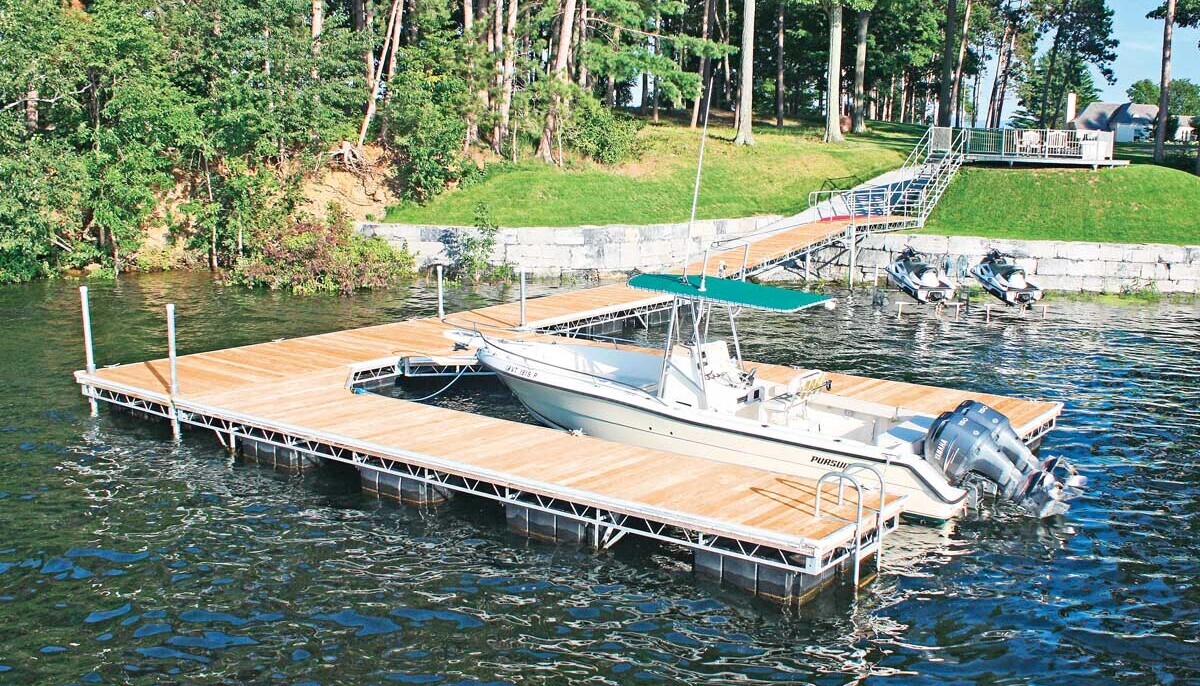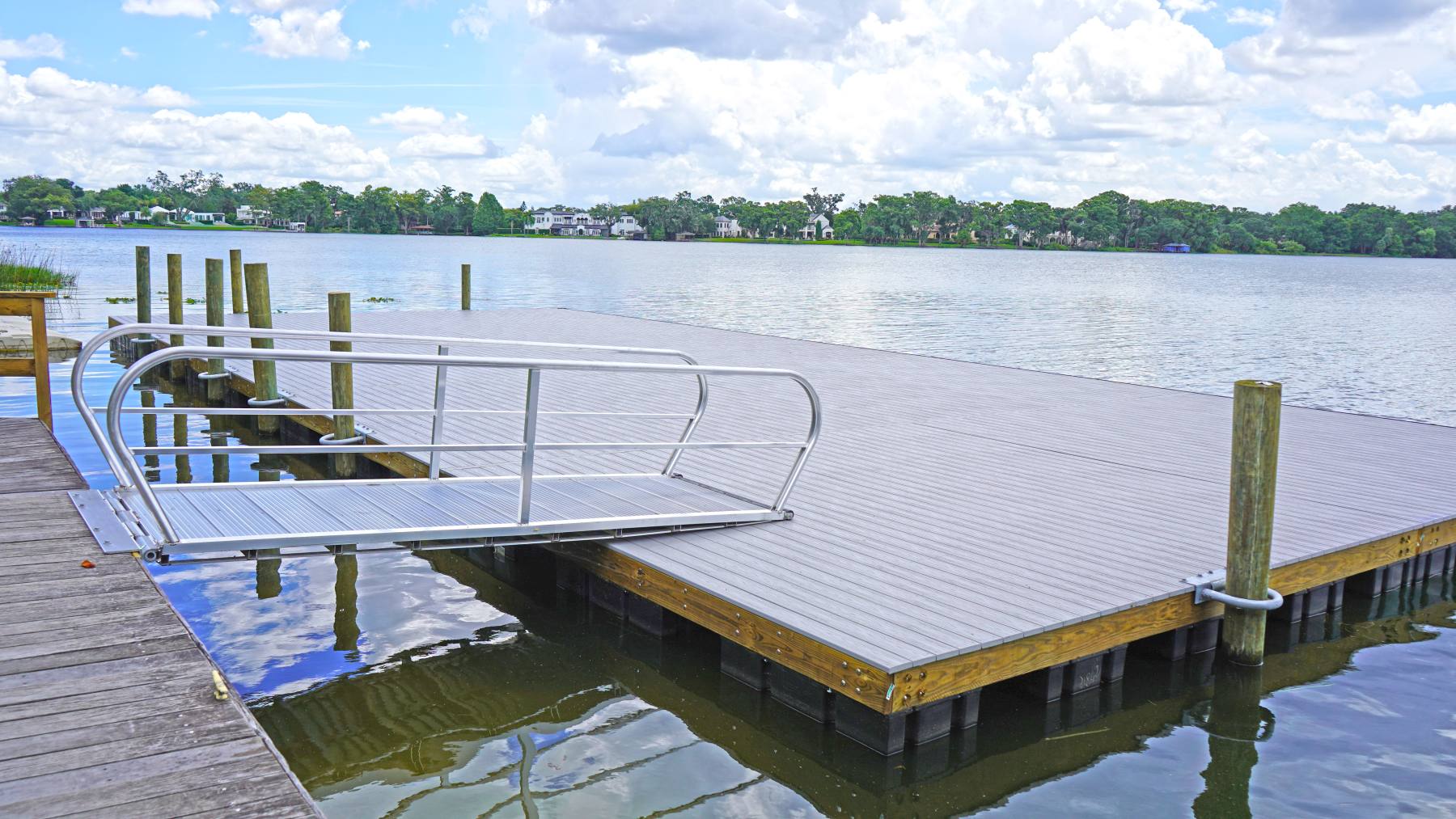Optimizing Your Outdoor Room with Specialized Floating Dock Providers
Optimizing Your Outdoor Room with Specialized Floating Dock Providers
Blog Article
Floating Docks: The Ideal Option for Versatile Water Access
Floating docks existing a compelling solution for a range of water access needs, offering flexibility that transcends typical mooring choices. The modular nature of floating docks assists in customization, catering to particular needs.
Advantages of Floating Docks
Floating docks offer countless advantages that improve water gain access to for different applications. Their capacity to fall and climb with changing water degrees makes them specifically helpful in atmospheres with changing trends or seasonal variations. This flexibility ensures that vessels can quickly tie without issue for the water's depth, supplying a dependable system for recreational, industrial, and commercial usages.
Additionally, floating docks are typically built from sturdy materials that resist rust, making them ideal for long-term use in aquatic settings. Their installment is usually less invasive than conventional set docks, decreasing the ecological impact and helping with quicker release (floating docks). This adaptability enables simpler moving or reconfiguration according to user demands or ecological changes
Safety and security is an additional key advantage; floating docks can give stable gain access to for individuals getting off or boarding from watercrafts and reduce the threat of mishaps related to unpredictable surface areas. Additionally, they can be developed to suit a variety of accessories, such as cleats and fenders, improving functionality. On the whole, floating docks stand for an effective solution for improving water accessibility across diverse industries while advertising safety and ecological sustainability.

Kinds Of Floating Docks
Different kinds of floating docks deal with various requirements and settings, each designed with certain attributes to maximize functionality. One of the most common types consist of modular docks, which include interlocking areas that enable simple personalization and expansion. These docks are excellent for recreational usage, as they can be customized to fit various watercraft dimensions and water conditions.
An additional preferred choice is the stationary floating dock, which remains secured in location but drifts with changing water degrees. floating dock builder. This kind is especially fit for locations with marginal tidal fluctuations, providing stable access for angling or swimming. Additionally, there are drive-on docks, which feature a sloped style that enables boats to conveniently drive on and off, making them suitable for individual watercraft and smaller vessels
For industrial applications, sturdy floating docks are readily available, built from reinforced products to stand up to considerable loads and harsh aquatic settings. Finally, environmentally friendly floating docks make use of sustainable products and layouts to reduce environmental effect, often including attributes like plant life to support regional wild animals. Recognizing the numerous kinds of floating docks makes sure that individuals can select the most suitable service for their certain requirements.
Installation Process Introduction
A successful installation of floating docks requires cautious planning and attention to information to guarantee optimum performance and safety and security. The initial action involves evaluating the site conditions, including water depth, existing, and prospective challenges. This evaluation educates the selection of the ideal dock materials and style customized to the particular discover this environment.
Next, acquiring necessary authorizations is crucial, as numerous jurisdictions have regulations concerning building on water bodies. The installation can proceed when permissions are secured. Begin by preparing the foundation, which might entail anchoring systems or pilings tailored to the dock kind and neighborhood problems.
Following the foundation configuration, construct the dock sections according to producer specs. Guarantee that all components are safely secured and aligned to hold up against ecological tensions. Position the dock in the marked area, guaranteeing it is degree and stable.

Upkeep Tips and Ideal Practices
After the installation process is total, ongoing maintenance plays an essential role in ensuring the long life and capability of floating docks. Routine assessments need to be conducted to determine any type of signs of wear and tear, damages, or wear - dock company. Examine for any type of loosened installations, splits, or separation in the dock sections, as these can compromise structural stability
Cleaning the dock is necessary to eliminate debris, algae, and other accumulation that can affect its look check this site out and security. Make use of a gentle stress laundry occasionally to maintain cleanliness without creating damage to the surface. Additionally, using a safety sealer every few years can assist enhance durability and resist ecological wear.
Focus on the mooring lines and anchors, guaranteeing they are totally free and safe from rust. Replace any type of abject components without delay to stay clear of threats. Seasonal changes might also be essential; during severe weather condition conditions, repositioning or enhancing the dock can stop damages.
Applications for Floating Docks
Floating docks serve a plethora of applications, dealing with both commercial and leisure requirements. In entertainment settings, they provide smooth access to waterways for activities such as boating, fishing, and swimming. Their adjustable nature permits setup in differing water levels, making sure secure and safe access no matter of tidal fluctuations.
Commercially, floating docks are vital for marinas and waterside organizations. They facilitate the docking of vessels, making it possible for efficient loading and discharging of items. Their modular layout enables very easy development or reconfiguration to fit transforming service needs, making them suitable visit for watercraft leasings, scenic tour procedures, or fishing charters.
Furthermore, floating docks are utilized in environmental applications such as aquatic research and environment restoration. They can work as platforms for scientific research studies, keeping an eye on water quality, or conducting wild animals studies without disturbing sensitive environments.
In industrial contexts, floating docks are utilized in construction tasks, giving access to hard-to-reach areas for devices and employees. Their flexibility, longevity, and very little effect on the atmosphere make them an optimal selection for a variety of applications, improving both capability and access in different water-based environments.
Final Thought
In verdict, floating docks stand for an optimum solution for diverse water access requires, owing to their adaptability, sturdiness, and modular layout. Floating docks offer as a beneficial asset for recreational, commercial, and environmental projects, making sure dependable accessibility to waterways and promoting sustainable practices in marine settings.
Floating docks present a compelling service for a range of water gain access to requires, providing versatility that goes beyond typical mooring options.Floating docks deal countless benefits that boost water access for numerous applications. Overall, floating docks represent an effective remedy for enhancing water access across varied sectors while promoting safety and ecological sustainability.
One more preferred alternative is the fixed floating dock, which continues to be anchored in place but drifts with transforming water degrees.In final thought, floating docks represent an optimal remedy for varied water gain access to needs, owing to their flexibility, durability, and modular layout.
Report this page